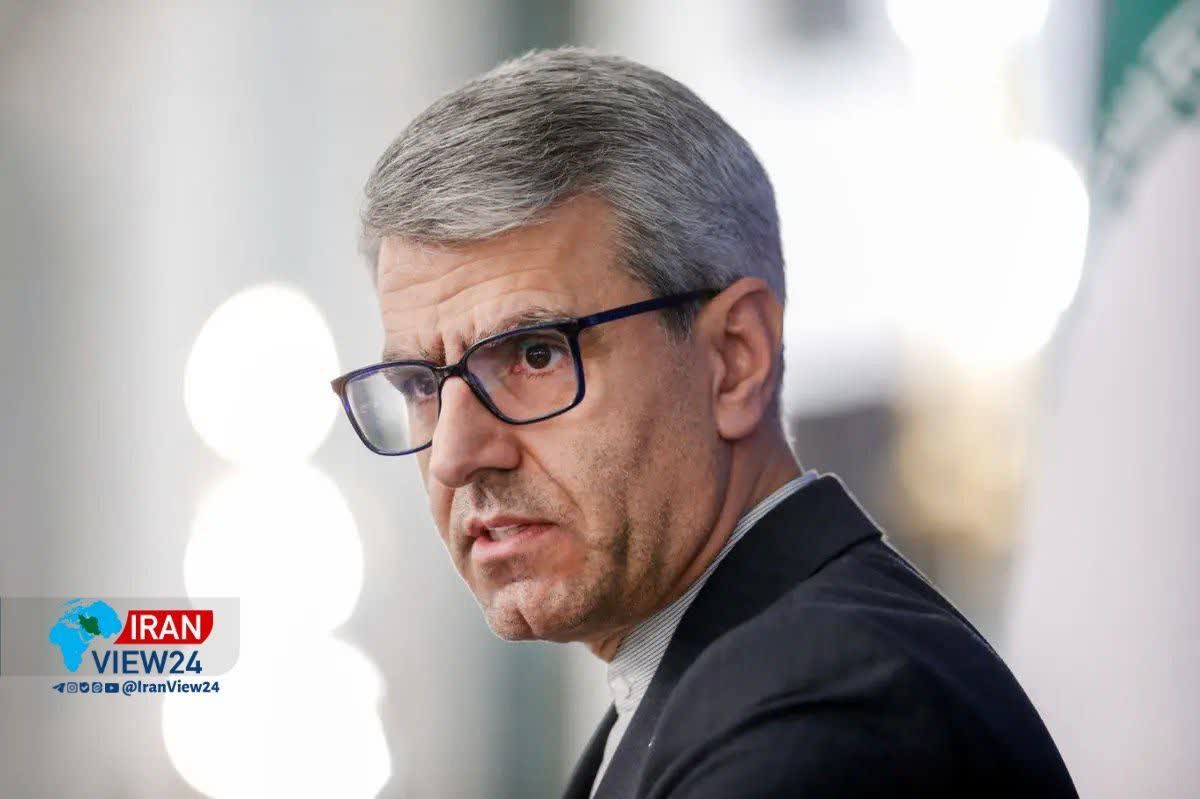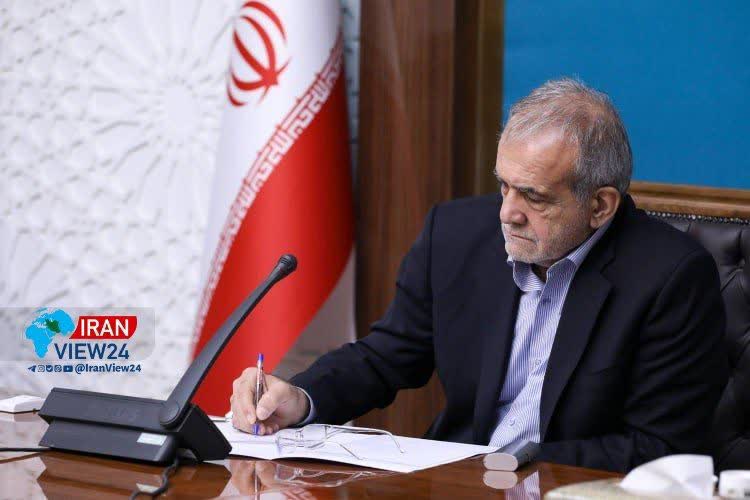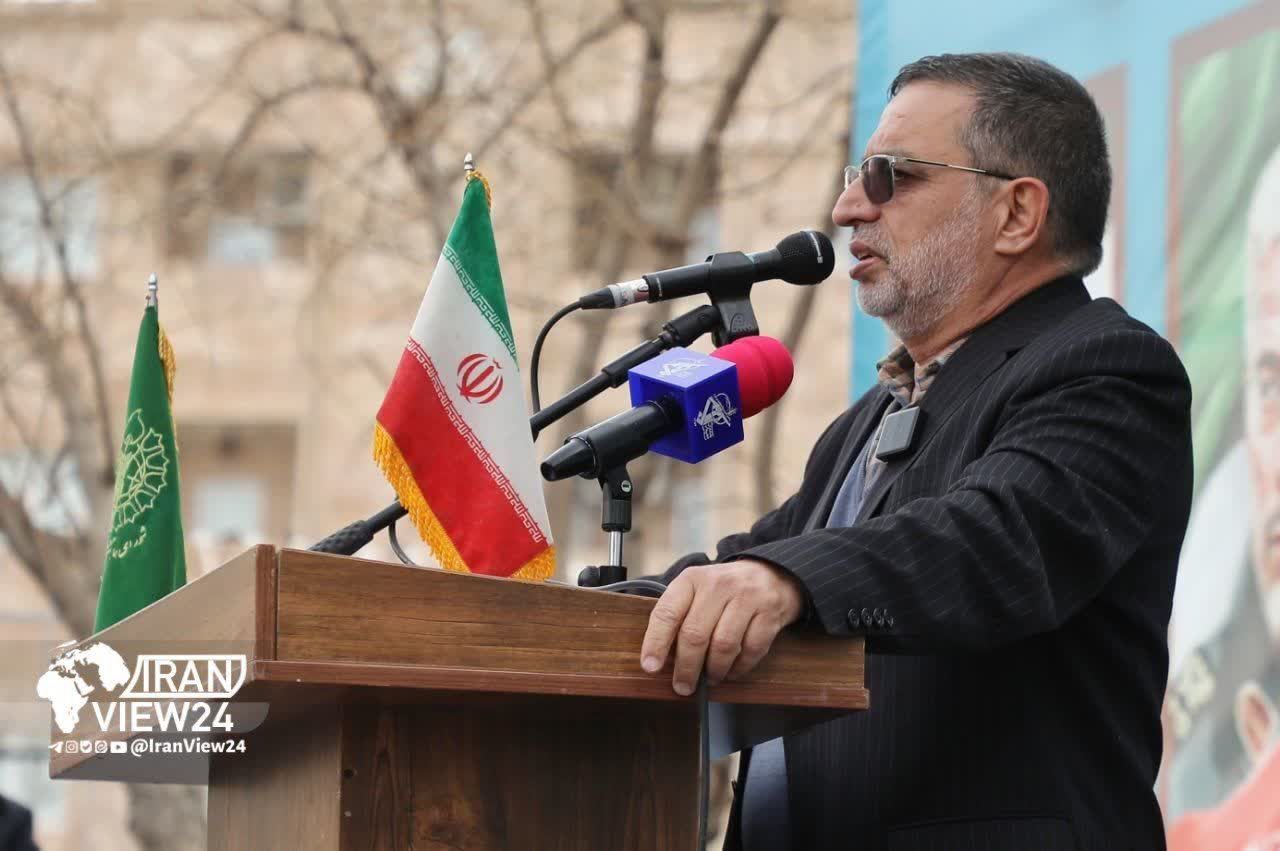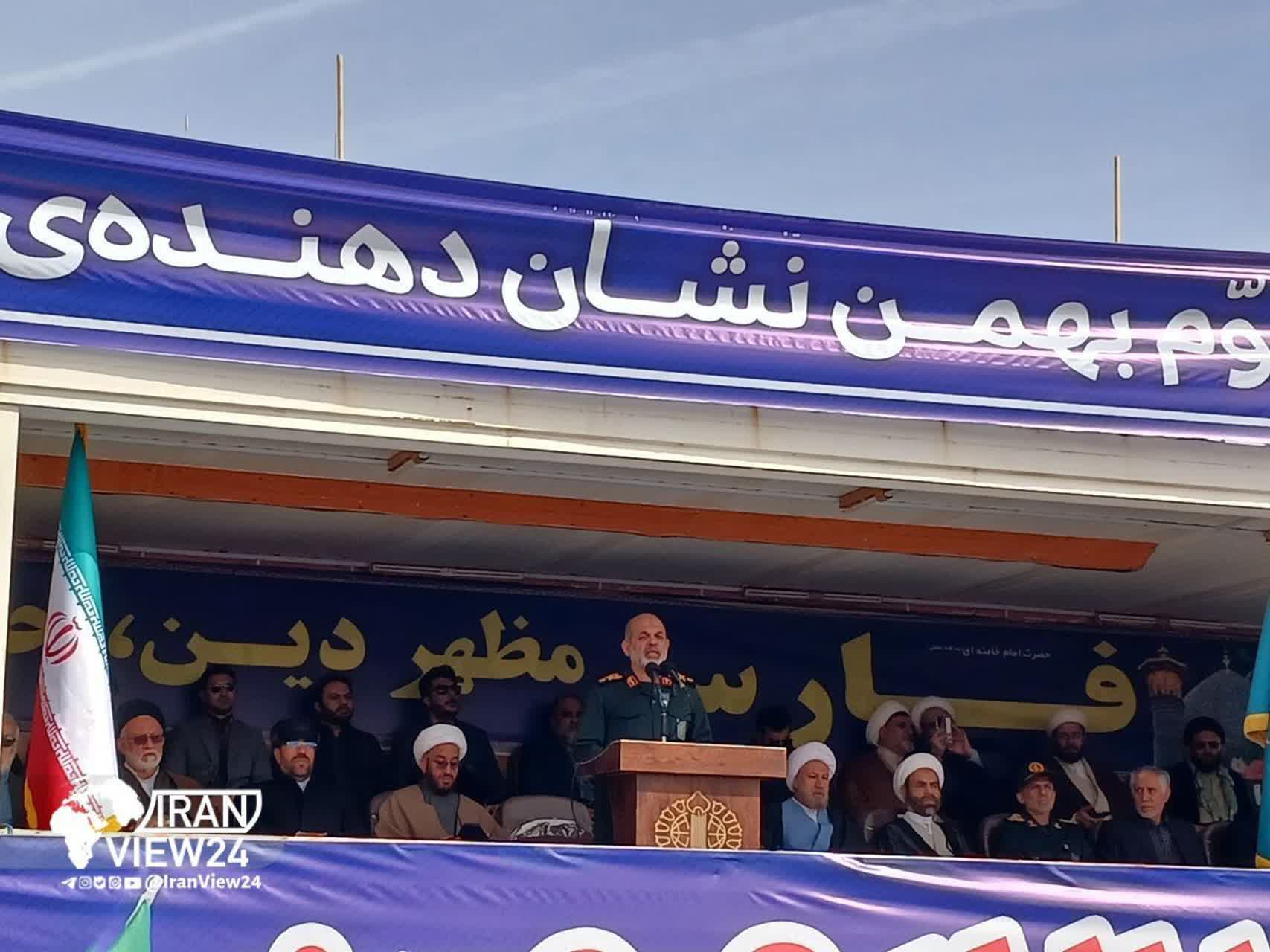In the midst of the war of narratives and the struggle of global powers, Aníbal Garzón, Spanish sociologist and professor, believes that the Iran–Israel conflict cannot simply be reduced to a historical or regional confrontation. He considers this confrontation a reflection of the clash between two different logics: the “U.S.-centered and Western unipolar order” versus the “emerging Global South order,” which, driven by BRICS and new geopolitical linkages, seeks to redefine power and sovereignty in the twenty-first century. From Garzón’s perspective, the media, diplomatic language, and Washington’s double games are just as important as bombs and tanks; and this conflict, more than being a limited crisis, is a stage of a tense transition toward a multipolar world.
Elaheh Tahmasebi – Iran View 24
In a world where the balance of power is undergoing transformation, the Middle East remains one of the most sensitive and volatile arenas of geopolitical competition. The confrontation between Iran and Israel is not merely about history or regional borders, but about the very meaning of the future world order—an order shaped on one side by the United States and its Western allies, and challenged on the other by emerging powers and the countries of the Global South. In such a context, media, diplomatic language, and international alliances are as significant as missiles and military bases. To explore these complex dimensions, we spoke with Aníbal Garzón, Spanish sociologist, university professor, and author of the book “BRICS: Transition to an Alternative World Order.”
To what extent can the current tensions between Iran and Israel be evaluated not merely as a regional confrontation, but as part of a broader geopolitical rivalry between the “U.S.-centered world order” and the forces opposing it?
The confrontation between Israel and Iran goes beyond a historical conflict; the dispute has existed since the Islamic Revolution of 1979, when Iran consistently supported the Palestinian people, and one of its pillars has been the defense of Palestine and opposition to the constant human rights violations committed by Zionism against the Palestinian people, namely in the West Bank and Gaza. We can analyze that in the 21st century, it is not only this historical reality that has accelerated the conflict, but it is also related to the analysis of the international context. We clearly know that Israel is an ally of the Western model led by the United States with its dependent partners such as the European Union, NATO countries, and the G7. And Iran, despite all the sanctions imposed on it by the United States and Europe to isolate it, has established important alliances in the Global South with China, Russia, Latin America, and African countries. And this creates a picture on the geopolitical map in which Israel is confronted with Iran in a model dominated unipolarly by the West and the United States, and a new and transitional model in which countries, emerging economies, and Global South states also want to have a voice in this world order. Therefore, this is not just a historical conflict, but one that goes beyond current realities. We know that today Iran’s relations with China and Russia are at a high level, something that has managed to overcome the sanctions and blockades that the West has tried to impose. Or even its relations with countries like Venezuela, both OPEC members, and since the Ahmadinejad era with Chávez they established strong alliances, two countries culturally very different with very different political and economic models, but which created alliances to defend their sovereignty. Therefore, the issue here is the values of intervention and domination from the West, and in this case Israel, which is a piece and ally of the United States, versus the values that new models from the South bring, in which the attempt is to strengthen sovereignty and mutual respect. This is the conflict that has emerged in 2025. It is not just a historical matter between two countries, but an international-level dispute between the old world order, we might say, and the new world order.
Are Western media narratives about Iran and the recent conflicts with Israel realistic and impartial? What kinds of images of Iran can be identified as being reproduced by international media?
Regarding the issue of Western media narratives about this conflict, it is clear that Western media have reflected this military confrontation between Israel and Iran, the attacks that have been carried out from both sides. It is evident that Western media have portrayed Iran as the main culprit or the enemy in this context. And this has a lot to do with the issue of language, while Western media depict Israel as a democracy, a model similar to the West, despite human rights violations, violations of international humanitarian law, and the genocide it has long been committing in Gaza. But it is clear and observable that Europe, for example, invites Israel to European international events such as Eurovision and sports events, while no sanctions have been imposed on Israel. Whereas Russia was sanctioned, this was not done with Israel — this is a double standard. And thus, the media narrative, soft power, the media, play a fundamental role in legitimizing Israel in this conflict, while regarding Iran, they have always, through their language, called it a regime, the regime of the Ayatollahs, tyranny, dictatorship, in order to make it clear in this conflict that Western public opinion is allied with Israel and not with Iran. Therefore, we must not forget that in a conflict, there is always more than hard power, bombs, tanks, and artificial intelligence. The issue of language, the issue of communications, especially in the society of communications and information, plays a very important role and has great significance, and this is closely related to social media, how they try to sanitize the Western ally at all times and make it appear as though it is defending itself, the concept of defense, while the aggressor is the enemy, which in this case they try to depict as Iran. Therefore, we must analyze that the issue of communicative language in this confrontation is very important.
How should the role of the United States in the recurring tensions between Iran and Israel be analyzed? Can this confrontation be seen as a reflection of interventionist policies and the security order backed by Washington?
The role of the United States has been revealed. The United States has played a double game. At one point, the United States was apparently negotiating with Iran to lift sanctions and to explore how to reach a solution, but all of this was just a show. Let us not forget the G5+1 agreement, in which there were attempts to negotiate with Iran regarding its nuclear program in exchange for lifting sanctions. Germany, the European Union, France, the United Kingdom, the United States, China, and Russia took part in it. If I am not mistaken, the U.S. withdrew from that agreement in 2019 or 2018, which had been signed under Obama, in order to further isolate and block Iran, Israel’s main rival. Thus, while the United States claimed on the one hand to be negotiating, it consistently supported Israel militarily in that confrontation. And this is the very double game that the U.S. has always tried to play: deceiving public opinion by saying it is negotiating, that it is defending human rights, international law, and all international relations, and that it is seeking mutual respect for sovereignty—while at the same time being the main military partner. More than 60 percent of the weapons that reach Israel come from the United States. Thirty-some percent come from Germany, and 1 percent, if I am not mistaken, from Italy. But the primary partner is the United States. If Israel considers itself to have legitimacy and legality, so to speak, to carry out this genocide, to bomb Syria, to bomb Lebanon, Yemen, Palestine, Iran—in other words, what we call the entire regional confrontation—this is because it sees itself as possessing moral authority, since it is supported by the North American empire. And there the role of the United States is clearly seen, making it clear that international law and the world order are not a global order, but a Western order created from Washington and by Washington, especially after the end of World War II. And today, there is a dispute, and of course it is outdated, especially with countries like China or Russia that are now dismantling that model, which is proving less and less effective in a world order where emerging economies are rising. And among them, Iran plays a particularly important role as a member of BRICS, a bloc created in 2009 and composed of Brazil, Russia, India, China, and South Africa. Later, in 2023, Iran joined alongside Egypt and the United Arab Emirates. Argentina ultimately said it would not join. Saudi Arabia has wavered between joining and not joining. Ethiopia also joined, and the latest country was Indonesia. In addition to the 10 countries that today make up the BRICS members, partners such as Cuba and Bolivia have integrated, and there are some interested states, most of which are in the process of joining. If we include those interested countries, nearly 40 countries are joining BRICS, which is beginning to transform that U.S.-dominated world order, moving toward de-dollarization, away from the IMF, the World Bank, and all those aspects. Iran plays a fundamental role in the Middle East. Let us not forget that in 2023, Iran initiated the process of establishing relations with Saudi Arabia, in which China played an important role as a key mediator. China, a BRICS country, while Saudi Arabia has not yet accepted joining BRICS, has not rejected it either. And thus, relations between Iran and Saudi Arabia have been strengthened, despite having long been rivals between Sunni and Shia. This is something that displeases the United States, given that Saudi Arabia has historically been its regional partner, and also displeases Israel, knowing that Saudi Arabia could have established relations with Israel, which has now been disrupted. And here it can be seen that the role of the United States has been significantly diminished in its hegemony.
In conditions where the United States and its allies use the concept of “legitimate defense” to justify preemptive attacks, how should the concept of legitimacy in the defensive actions of non-Western countries like Iran be redefined?
The issue of the concept of legitimate defense is something that the West has constantly used. NATO, since 1949 as an organization led by the United States, a North Atlantic defense pact, has never implemented a defensive pact. On the contrary, it has done precisely the opposite, especially in the 21st century, when there have been attacks and invasions of Libya, Syria, Afghanistan, Iraq, even former Yugoslavia in Serbia—countries that were not militarily threatening the West. Thus, it is clear that this concept of defense is a lie. It is part of the entire Western discourse used to legitimize its aggressions against other countries—blockades, sanctions, military invasions, and the 800 military bases the United States has established. Thus, the language of democracy, the language of defense—all of this is a lie used at every opportunity to manipulate public opinion and portray the other as evil and as the enemy. And for this reason, they claim they must take various actions to defend this model of modernity and Western democracy. And it is becoming increasingly clear, especially with what is happening now—the support for Israel’s genocide against the Palestinian people in Gaza—that all of this is, ultimately, a lie. One of the main violators of human rights on the international stage is precisely the United States and Israel. With social movements worldwide that support the Palestinian cause, this discourse has become outdated. This rhetoric is increasingly obsolete. Nothing remains of it but deceit and a ridiculous show, a fallacy, and, well, the more it is used as an excuse for aggression, the more obvious it becomes. Therefore, the so-called legitimate defense is empty, false, and what they are ultimately doing is attacking, to continue their international control and to keep their satellites in countries with economic, financial, political, and even cultural interests. This is the very foundation of American imperialism.
In the event of a broader war between Iran and Israel, who do you believe would be the main actors responsible for igniting this conflict? Western media usually portray Iran as the initiator. Is this portrayal realistic?
If a war breaks out between Iran and Israel, it will clearly be evident that this is not merely a confrontation between two countries. It will lead to a regional and international conflict. Let us not forget, as we said, that Iran has strong relations with BRICS countries. And even without BRICS being a military alliance, it has good military ties with Russia and China. And it is obvious that if Iran were to be overthrown, the West together with Israel would control the Middle East. That is why there are countries that support Iran in this regard, even including the relations we mentioned with Saudi Arabia. Because if Iran falls, they know that the West could then intervene against Russia as well, just as they are doing in the war in Ukraine. And ultimately they will attempt to bring down China too, as well as the entire South-South cooperation project of BRICS. It is evident that Donald Trump is highly concerned and has imposed tariffs on BRICS countries because he knows that this undermines U.S. hegemony. This increasingly shows how this conflict between Israel and Iran, even though Israel is not a NATO member, is backed militarily by its allies in Europe and the United States. At the same time, BRICS countries, although not military allies, would quickly move toward cooperation. Iran has carried out major joint military exercises with Russia and China. Therefore, the fall of Iran would mean the collapse of part of the BRICS project, the economic, cultural, and South-South cooperation project that they are pursuing. And this would not only threaten Iran but also other members such as Brazil and South Africa; an example being the interventions Donald Trump tried to push through tariffs against Brazil. The countries that are part of this dynamic of a new world order would also be threatened by it. This is not simply a bilateral conflict; we would be entering a regional and international confrontation.
We must also bear in mind that Israel possesses nuclear weapons, something it has never denied, and therefore violates international law. This state is not a member of the UN Security Council, and while Iran has been under the supervision of the International Atomic Energy Agency, we have seen constant dissatisfaction with those inspections, since it has been evident that they have not carried out the necessary objective oversight. While all these inspections have been extended to Iran, they have never been imposed on Israel, and Israel has never denied having nuclear weapons. For this reason, this conflict would escalate to the level of nuclear war, and this places the entire international community at risk—not just two countries in the region, and this is clear. That is why, in the first clashes that took place between the two countries in 2025, the focus must be on how to resolve this situation, because it represents a threat, particularly with regard to Israel. As we said, Israel has never been under any control, has never denied its nuclear weapons, and is militarily prepared. Israel is the partner of the United States, the number one military power, and therefore this generates constant tension and fear throughout the region. And I repeat, at the international level this is also a threat, due to their role in the continual violation of international agreements in the field of security.
Regarding how we can transform this whole situation we are analyzing into a more balanced one, it is evident that international institutions must change. The United Nations has failed in many respects. The UN Security Council is obsolete. It should no longer be only those five countries that emerged from World War II, at a time when there were only 51 states, whereas now there are 193. This situation must change, with the participation of Latin America, Africa, Asia—in general, the Global South—so that they have more decision-making power, as well as emerging powers that play key roles at the economic and international level. And therefore this must change. To transform this situation, in addition to creating organizations that are not so-called “international organizations” but rather Western ones, the International Criminal Court must play a much more neutral role in making decisions on these matters, and then it must be seen how the aspects of international society should evolve. This has been a failure, particularly since the fall of the Berlin Wall. U.S. hegemony has been evident, and they have used it, as in the invasion of Iraq, which was completely illegal and violated international treaties. Even when negotiation processes for lifting sanctions were underway, it was clear that these were lies, that there were no weapons of mass destruction—these were all continuous lies. This demonstrates that conditions must change, and that new roles must be given to important countries such as Russia, China, Brazil, African countries, Nigeria, South Africa, and Egypt, which must also have a voice and a vote in all these matters. Otherwise, we will once again face a world of colonialism and neo-colonialism, and that system will be enforced despite the fact that it faces significant resistance globally and growing South-South cooperation and the clear role of BRICS. The United States is a country that does not accept these international changes, it has its allies and satellites; the European Union is clearly dominated by NATO and has submitted to NATO. At present, NATO’s military budget has increased from 2% to 5%. Countries that were more neutral, such as Sweden and Finland, have joined this organization. This military role is clearly evident. The United States is also a war economy. The United States thrives on conflict. Therefore, its 800 military bases and historic military budgets are part of its economy. This, in addition to the financial sphere—because the United States has lost much of its productive assets—is why Donald Trump has tried to recover production through tariffs, and this makes the economy highly unstable because it is based solely on a war economy and largely on finance. And we can see how other more productive countries, such as those that produce raw materials or rare elements, like China and Russia, are increasingly taking on roles in this regard, just as Iran, a very important oil and gas country and an OPEC member, is doing.
Do you think that Israel’s aggressive policies in the region and the unconditional support it receives from the United States are not among the reasons for the persistence of instability and the expansion of conflicts in the Middle East?
It is clear that the United States and Israel will not relinquish their hegemony, and here it is important that not only the countries of the Global South, with BRICS, are implementing various strategies for a new order, but also the role of different cultures, different models, different countries—not only between good and evil or West and non-West—but also in achieving a multipolar world, is important. But above all, the countries that are partners of the United States and remain its main pillar are very important. And here the role of the European Union is clear. The European Union must decide whether it wants to continue with this loss of sovereignty and continue to allow Washington’s policies to decide what Europe must do. This has led to the growth of the extreme right and increasing dissatisfaction with the European Union, because this has been their constant weapon, such as imposing sanctions against Russia, which harms Europe’s own economy. And therefore Europe has a fundamental role. If we want to take power away from the United States and Israel, Europe must decide whether it will finally enter into a more peaceful coexistence, peace, and the creation of its own international relations with other countries, or whether it will continue as it has. We are witnessing a moment of tension. Therefore, Europe must understand that it has a very clear and fundamental role in this matter, a role that at present seems either unaware of it or unwilling to use it, and continues to be under the domination of the United States. This creates a very significant international instability, and we will see that the coming months and years will not bring good news.
We hope that negotiations and plans for changing the world order will increase day by day, and that especially the people of the South will be given a voice, and South-South cooperation will have more right to decision-making in all these situations so that conflicts are resolved peacefully. Considering that the Palestinian people are clearly suffering from genocide. Iran has given clear support to Palestine and it must have its own territory, and the violations of human rights committed by Netanyahu, which are genocide, must always be condemned, and all countries must unite their forces to put an end to this situation.







